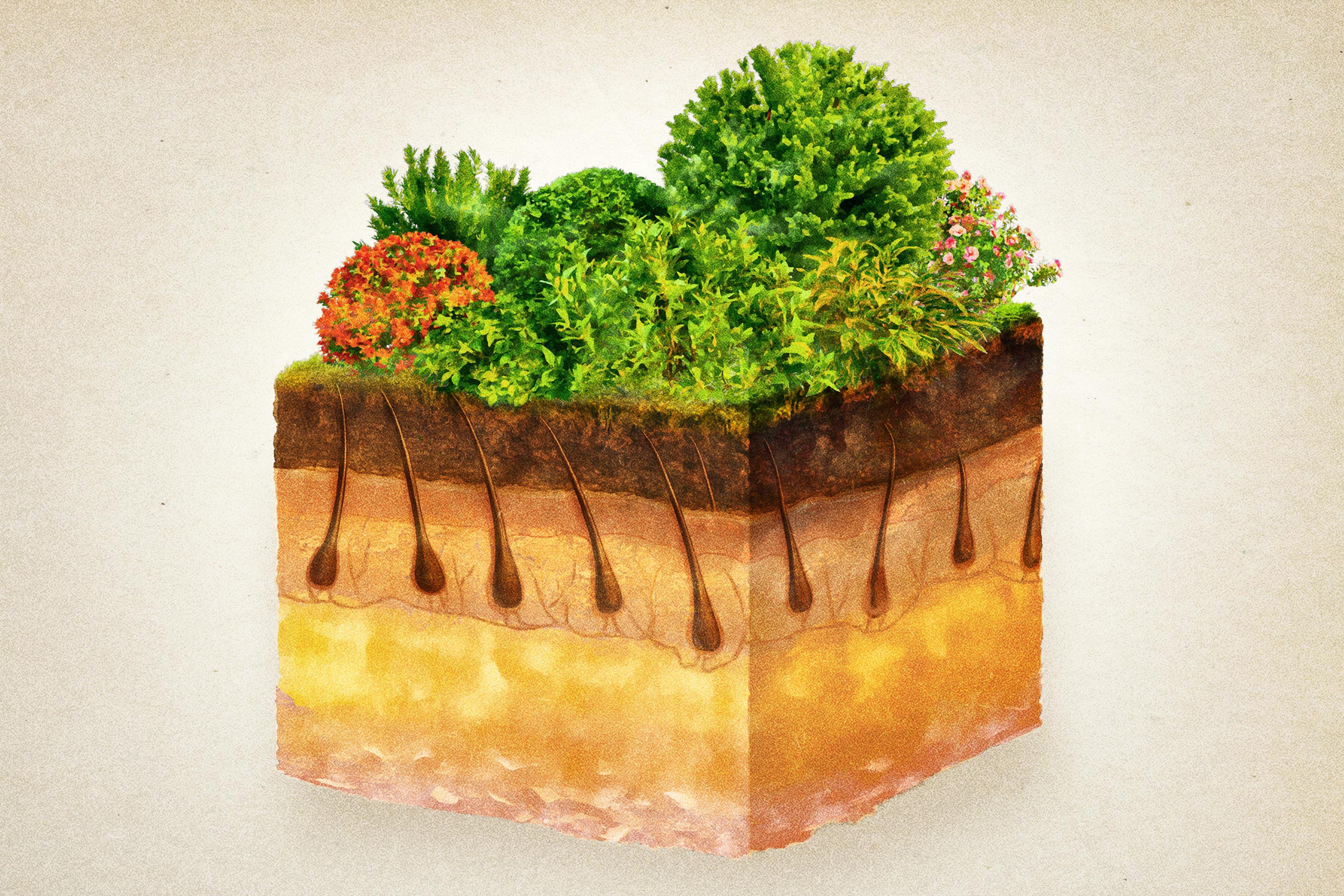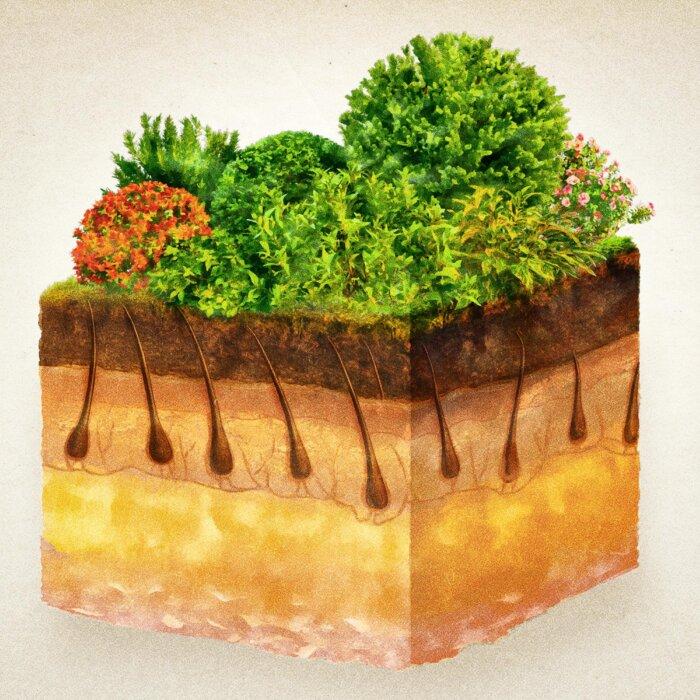While the effectiveness of such ancient remedies is difficult to verify today, one thing has been proven: Dietary choices can reduce hair shedding.
“If you want more hair, you have to invest in creating new hair,” Rajesh Rajput, fellow of the International Society of Hair Restoration Surgery, hair transplant surgeon, and holder of a postgraduate degree in plastic surgery, told The Epoch Times.
He emphasized that hair follicle cells are among the fastest-renewing cells in the body and “require [an] unlimited amount of nutrition.” Without adequate nutritional support, hair growth can come to a halt.
Essential Nutrients for Hair Growth
Hair growth requires vitamins, minerals, proteins, and omega-3s to provide nutrients for optimal hair follicle function. They support cell growth, enhance blood circulation, and help produce keratin, the main protein present in hair.B Vitamins
B vitamins are vital for the proliferation and metabolism of hair follicle cells—vitamin B7, also known as vitamin H or biotin, is noteworthy in that regard.Hair loss is one of the hallmarks of biotin deficiency. However, most healthy people do not need to take biotin supplements, as it is naturally produced by gut bacteria and readily available in a typical everyday diet. Good dietary sources of biotin include eggs, salmon, and pork.

While there is no evidence that biotin intake up to 200 milligrams per day is toxic to humans, excessive supplementation does carry certain risks. Too much biotin can “affect levels of other elements in the blood and cause unreliable blood work results,” Cindy Chan Phillips, a registered dietitian, told The Epoch Times. Such results can interfere with a physician’s ability to accurately diagnose other conditions, which is why many dermatologists advise against taking biotin supplements without medical supervision.
In addition to biotin, folate (vitamin B9) and vitamin B12 are also essential for healthy hair growth.
Folate is primarily found in vegetables, especially dark leafy greens such as spinach, asparagus, and Brussels sprouts.
Most people meet their folate needs through diet alone, though women of childbearing age remain at higher risk of insufficient intake.
Vitamin D
Vitamin D is another essential nutrient for healthy hair. It regulates the growth and differentiation of keratinocytes and may help protect hair follicles from damage caused by dihydrotestosterone (DHT), a key hormone related to the most common hair loss discussed in Part 1.Vitamins A and C
Vitamin A is necessary for the growth and differentiation of follicular cells. It also regulates sebum production, which helps keep the scalp moisturized and the hair naturally shiny. Vitamin C plays a crucial role in collagen synthesis, which supports keratin production—the structural protein that makes up hair.Zinc, Selenium, and Iron
The rapid division and growth of hair follicle cells rely on specific enzymes and trace elements, such as zinc and selenium, essential for the production and activity of enzymes. These minerals are also closely linked to immune system health.Zinc deficiency can lead to telogen effluvium, a non-scarring form of diffuse hair loss, and thinner, lighter-colored, and more brittle hair.

Vegetarians are particularly at risk for zinc deficiency, as zinc from plant sources is less bioavailable than from meat. Additionally, vegetarian diets often include more legumes and whole grains, which contain phytates—compounds that inhibit zinc absorption.
Iron absorption requires an acidic environment, meaning people with malabsorption conditions such as celiac disease, low stomach acid, or those taking antacids may face a higher risk of deficiency. Vegetarians are also more likely to have low iron levels, as plant-based diets provide non-heme iron, which is absorbed less efficiently by the body.
Protein and Omega-3
Just as bricks are essential for building a house, dietary protein provides the raw materials the body needs to maintain cellular functions, including hair growth. Inadequate protein intake can lead to thinning hair and increased shedding.The Problem With Supplements
Typing “hair loss supplements” into Amazon brings up more than 5,000 product listings.However, the effectiveness of supplements is difficult to prove in human trials. Unlike animal studies, human trials face greater challenges in controlling variables such as diet and lifestyle, which can affect outcomes. As a result, some clinical studies have produced inconclusive or inconsistent findings. Moreover, many trials are funded by product manufacturers or developers, which may introduce bias.
“Unfortunately, there are plenty of hair supplement products in the marketplace, but there is little evidence of their effect,” Phillips said. She added that dietary supplements are not regulated by the U.S. Food and Drug Administration.
For those who choose to take supplements, she recommends selecting products from reputable sources—specifically, brands independently tested by organizations such as the United States Pharmacopeia, NSF International, or ConsumerLab. However, she said certifications focus on ingredient accuracy and product safety, not on proven efficacy for hair growth.
More is better doesn’t always apply when it comes to certain nutrients, Phillips noted. Taking supplements without understanding your nutrient needs can backfire—and in some cases, do more harm than good.
For example, taking vitamin D supplements without a deficiency can raise levels beyond the safe upper limit, potentially leading to excessive calcium buildup in the body and worsening hair loss, she said.
Beyond vitamin D, research has shown that excessive supplementation of certain nutrients—including selenium, and vitamins A and E—may also contribute to hair loss.
A well-rounded diet is generally sufficient to meet the body’s needs for vitamins and trace minerals. Two to 3 ounces of protein and 1 to 2 cups of vegetables or fruit per meal can help support the health of hair and overall well-being, she said.
Mittal agreed. “All of this comes from having a good, balanced nutritional diet.”
The Role of Diet
Following a Mediterranean-style diet has been associated with a reduced risk of male pattern hair loss—a benefit largely attributed to its abundance of fresh herbs and vegetables. The diet also includes fruits rich in polyphenols, compounds known for their potent antioxidant properties.“Mediterranean diet ... is an anti-inflammatory, antioxidant diet ... beneficial for hair growth,” Phillips noted.

Ultra-Processed and Sugary Foods
Diets high in ultra-processed foods have been linked to increased inflammation in the bloodstream and the scalp. These foods are typically high in calories and contain additives that encourage overeating, contributing to obesity—a known risk factor for hair loss.Calorie-restricted diets have also been associated with increased hair shedding.
Key to Hair Growth
Hair is metabolically active tissue, which is why nutrients that support regeneration, metabolism, and cellular renewal—such as protein, B vitamins, vitamin D, and minerals—are important for maintaining healthy hair growth.A balanced diet remains the simplest and most effective way to obtain essential nutrients.
Phillips stated that focusing on whole, unprocessed foods rather than on packaged or highly processed products delivers nutrients your body needs and lowers the risk of overconsumption of those nutrients. The Mediterranean diet is one widely recognized example of a balanced eating pattern.
Many people experience inflammation caused by chronic stress, often without realizing it until symptoms such as hair loss or weight gain appear. “It is so common now,” Phillips said.
Maintaining a healthy, well-rounded diet can help counteract the effects of stress—particularly when combined with regular physical activity and adequate sleep, which can enhance resilience and recovery.
A balanced meal typically includes 2 to 3 ounces of protein, at least one cup of vegetables, and half a cup of whole grains. Whole grains are high in fiber, which can help reduce inflammation, Phillips noted. She recommends eating colorful vegetables daily, ideally incorporating multiple kinds into each meal. Rotating among at least three different types of protein throughout the week is also beneficial—for example, fish on Monday, chicken on Tuesday, and beef on Friday.
Supplements can be helpful for people who cannot obtain sufficient nutrients from their diet or have certain nutrient deficiencies.
However, Rajput suggests not taking all supplements daily. Taking all of them at once is like bringing every kind of construction worker to a job site at the same time—it can lead to chaos and inefficiency. Instead, he recommends grouping supplements that work synergistically, such as pairing folate with iron or B vitamins with protein. Spacing them out across different days of the week may also improve their effectiveness and absorption.
















